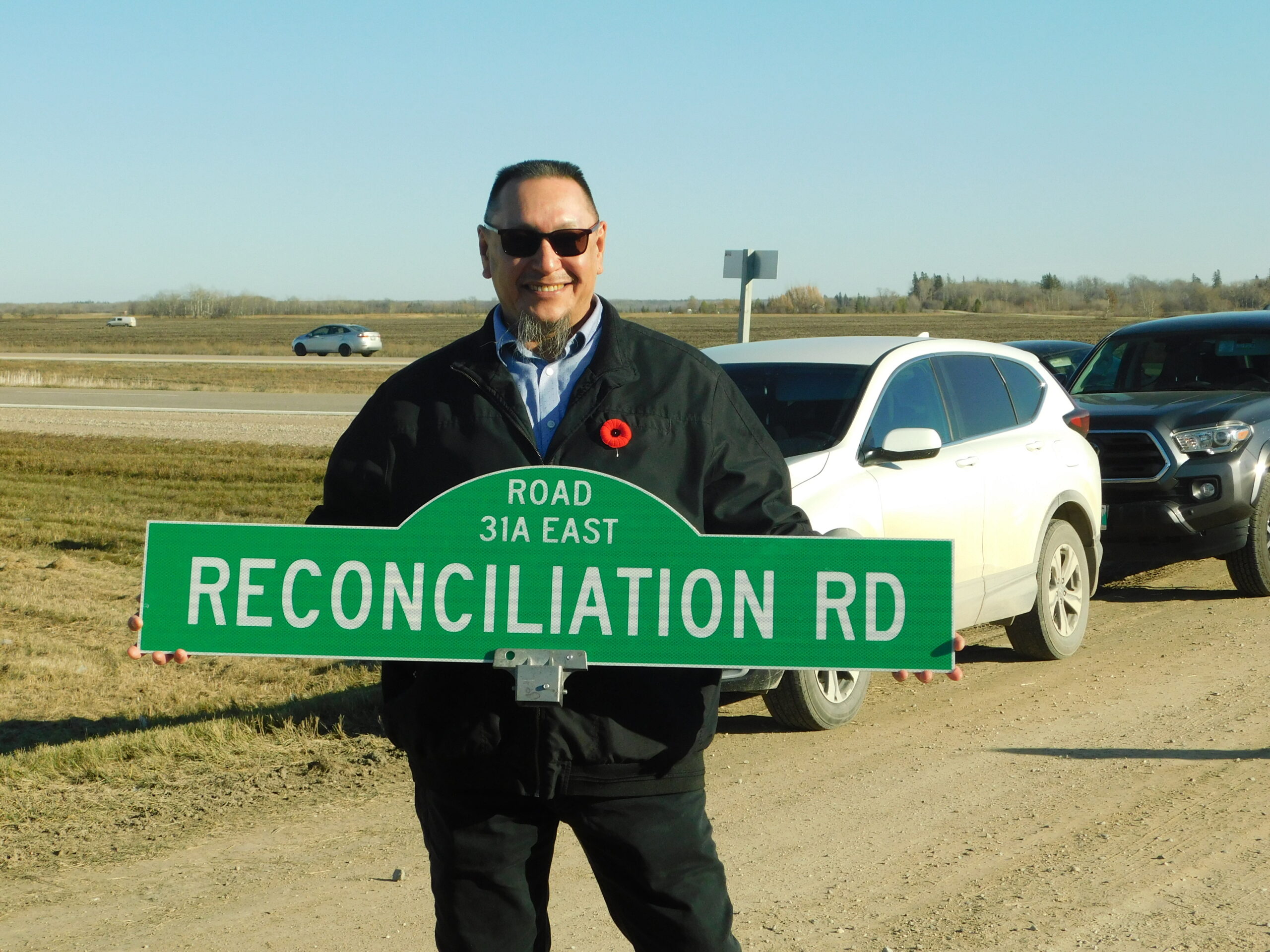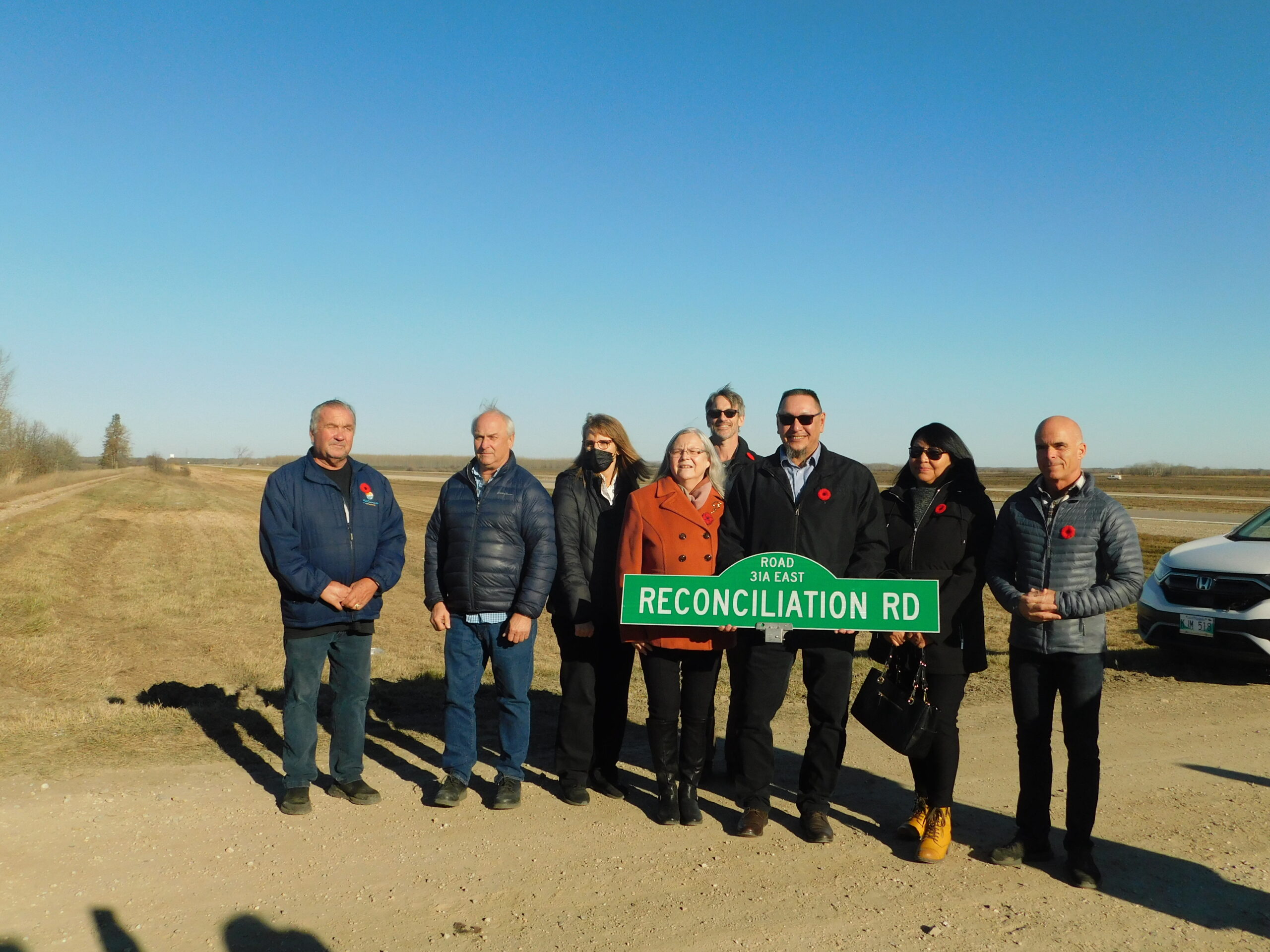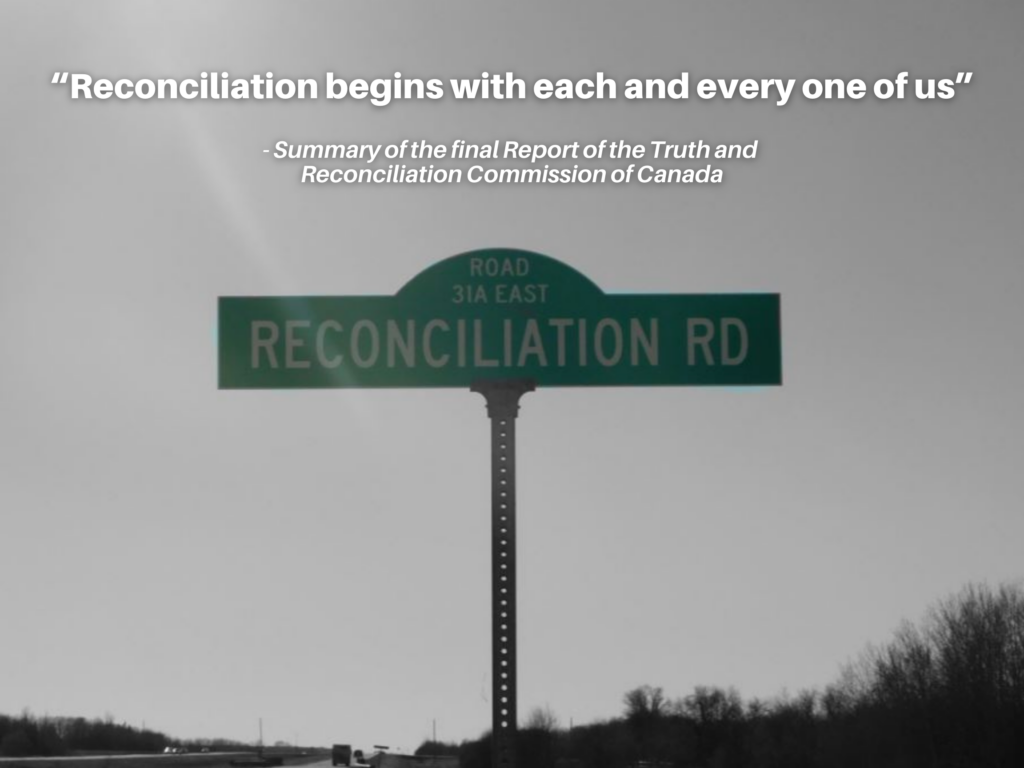
In the spirit of reconciliation, the two communities of the Rural Municipality of St. Clements and Brokenhead Ojibway Nation embarked on a collaborative approach to seek a solution to the naming of Colonization Road located in Libau, Manitoba.
It currently resonates with those who have been affected (directly or indirectly) by colonialism, are reminded by the display of colonial public names and the negative impact of colonization. As a result, the road has now been renamed to Reconciliation Road.
On Monday, November 8th we held a special announcement event with our Mayor and Council, Chief and Council of Brokenhead Ojibway Nation and other dignitaries as we celebrated this step towards reconciliation.
Our CAO, Deepak Joshi, began the event by acknowledging that we live and work on Treaty 1 territory. “We acknowledge the harms and mistakes of the past, and we dedicate ourselves to move forward in collaboration with our indigenous nations in the spirit of reconciliation” Deepak said. He then asked that we pause for a minute of silence as we honour Indigenous Veterans Day that is held annually on November 8th.
Chief Deborah Smith of Brokenhead Ojibway Nation spoke. “Boozoo! Ndinewamaginadook! Miigizzi Ikwe dishnikaz! Atik doodam! It is my honour to be here this morning to represent the Anishinaabe of the Brokenhead Ojibway Nation on Treaty 1 territory.
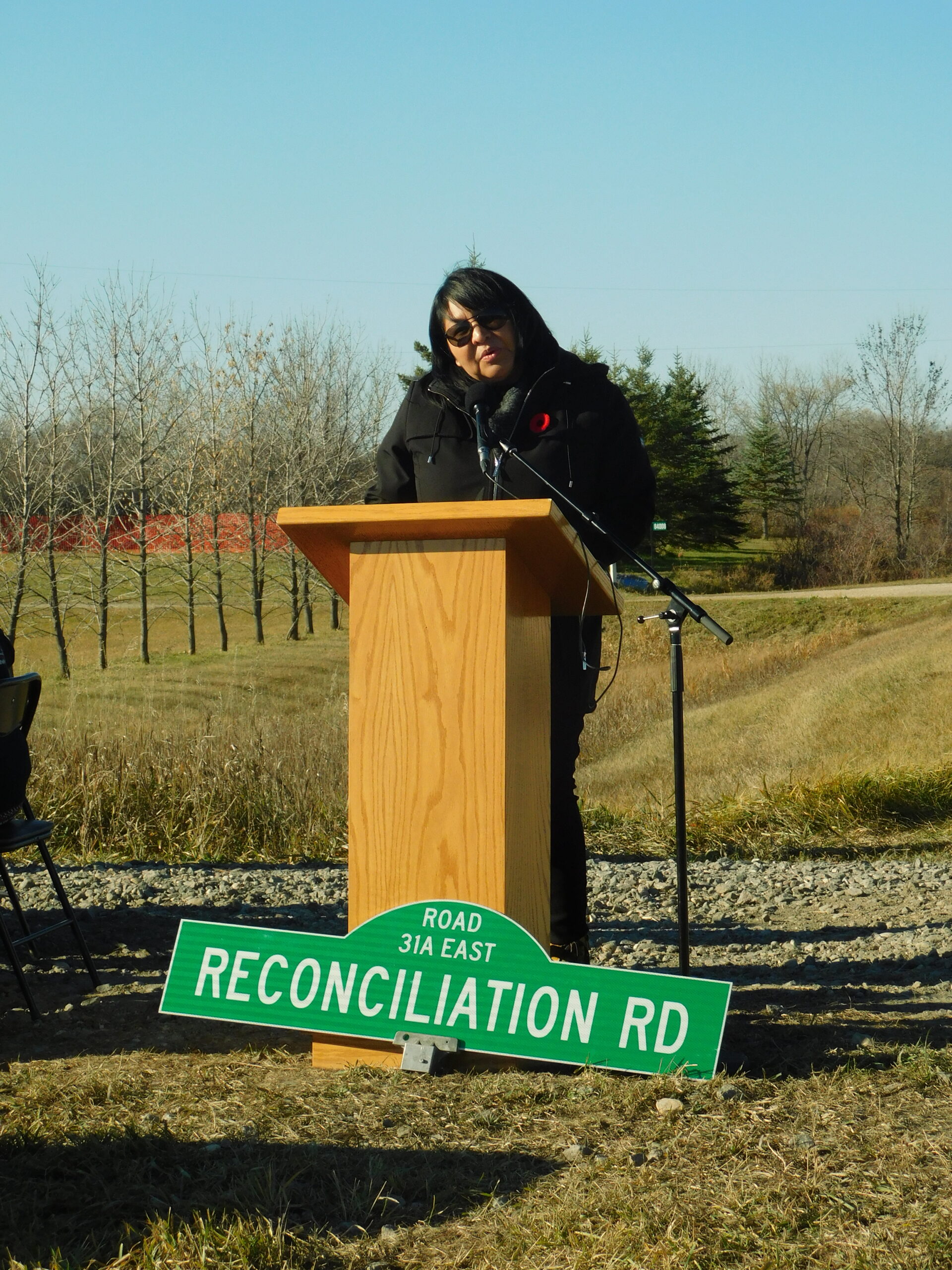
I would like to first acknowledge the leadership of the RM of St. Clements, Mayor Debbie Fiebelkorn and her Council and acknowledge the collective effort that was put forth by both communities to commemorate the renaming of Colonization Road.
I also wish to acknowledge Earl “Buddy” Prince who brought this issue back to the forefront and whose efforts helped get the process started for the Council of the Brokenhead Ojibway Nation back in September of 2020.
The history of Colonization in Canada is a painful history for Indigenous people, we know all too well that history as for us, it is a lived experience, it is an experience that isn’t found in the history books of our schools, but in the resilience of our elders, our men, and our women and most importantly the one that requires a lot of hard work to rebuild our Nations, our communities, and the hearts of our people. Part of the road ahead involves ensuring that our nonindigenous neighbours continue to learn, continue to educate and inform themselves on the history of Canada. Education is a powerful tool.
I want the remainder of my comments to focus on the path forward and the work ahead for both of our communities. As Chief of Brokenhead, I see the renaming of Colonization Road as emblematic, the road symbolizes travelling to a destination, my hope that this first step leads us to a greater understanding of what we must do collaboratively to evoke transformative change, to create true treaty partnerships between our two levels of government.
There are many great examples across this country that speak to the benefits of what happens when First Nations and Municipal governments come together, those benefits are realized when we can say that both of our citizens have an improved quality of life.
Our communities have many collective issues ahead that we must work together on, issues with respect to climate change and the protection of our eco-systems and habitats; we also share the concerns with respect to infrastructure needs and the replenishing of roads, waste management and future water needs and most importantly we need to create a table specifically on regional economic development opportunities that will benefit citizens of the Brokenhead Ojibway Nation and the residents of the RM of St. Clements equally. We have lots of conversations and dialogue ahead and I look forward to those discussions.
In closing, I am happy that Brokenhead Ojibway Nation played its part in helping dismantle colonial public symbols that normalize colonization. I also know that we need to work together as Treaty partners in the true spirit and intent of Treaty 1 to ensure that the next 7 generations will fully realize their rightful place within the country and lands of our ancestors.
I wanted to leave you with a quote from Maya Angelou who was an American poet, memoirist, and civil rights activist. She wrote: “Do the best you can until you know better. Then when you know better, do better.” I believe that we are all at a place of knowing better and it is imperative that we all commit to doing better.
Miigwetch Kizhi Manitou, Nimishomis, Nokomis, Miigwetch and Miigwetch for the opportunity to speak here today.”
Mayor Debbie Fiebelkorn of the RM of St. Clements then spoke. “Good Afternoon Everyone. Thank you all very much for coming out and joining the RM of St. Clements Council and Brokenhead Ojibway Nation Chief and Council to formally unveil the new road name.
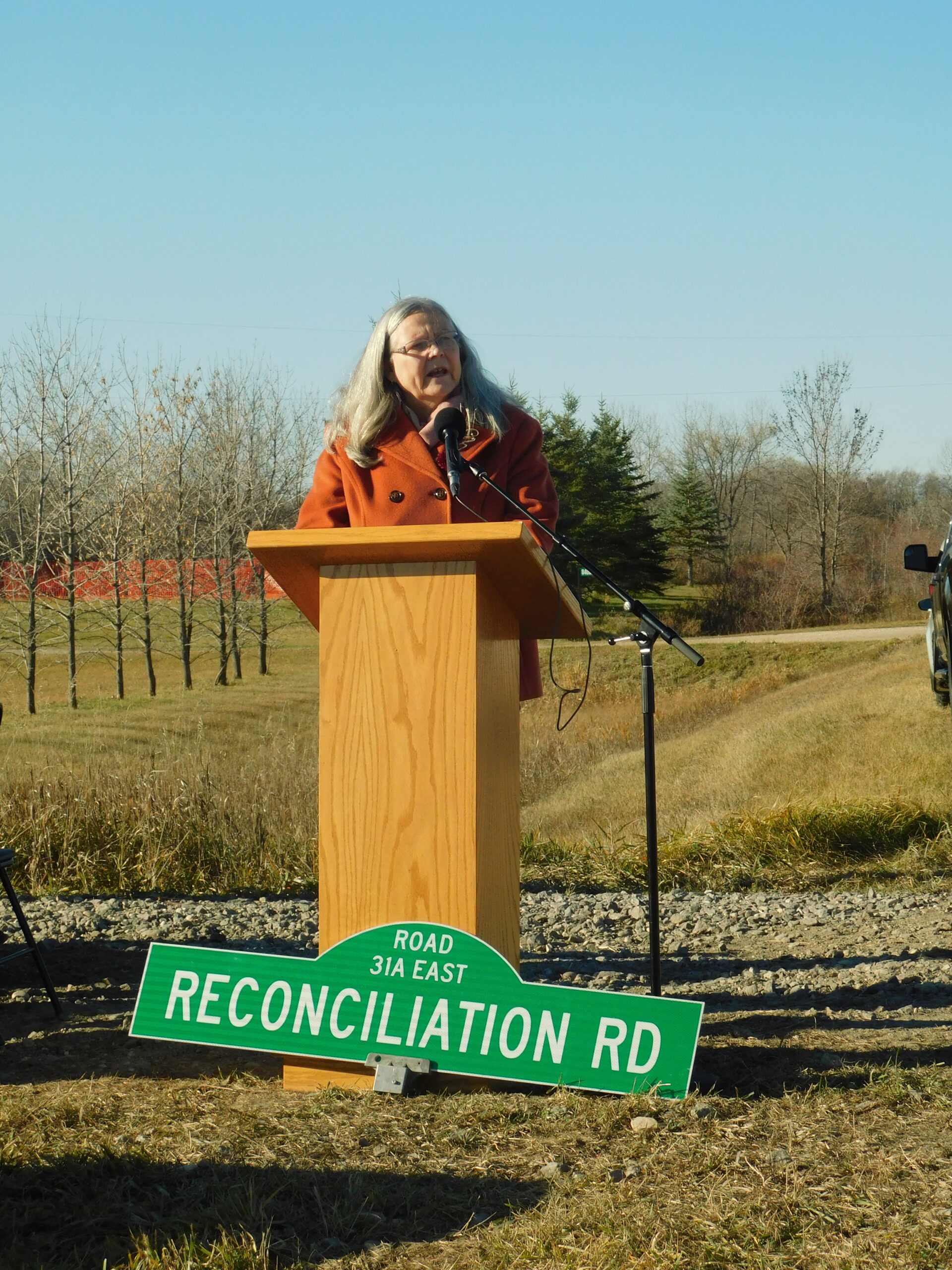
Before we begin, I would like to acknowledge that we are in Treaty 1 Territory and the land on which we gather is the traditional territory of the Anishinaabe, Cree, Oji-Cree, Dakota and Dene peoples and the homeland of the Metis Nation.
This has been a journey and learning experience for many of us as we move forward on the road to reconciliation.
The process for the renaming of the road started very simply by a Facebook post asking council to consider renaming the road as it resonates with those who have been affected by colonialism.
For our council this was a request that we were unsure how to proceed with. After some discussion it was decided that we should engage the Brokenhead Ojibway Chief and Band Council and have a meeting on how to proceed. That meeting took place on September 11, 2020, and after much discussion, St. Clements and Brokenhead Ojibway Band Council released a joint press release on the initiative. An official request to rename the road came from Brokenhead Ojibway Band Council on September 21, 2020.
The St. Clements council did have other things to consider, we needed a process on how to move forward, residents living on the road needed notification and the RM needed a policy on renaming roads/streets.
Residents on the road were notified, a street naming policy was adopted by council on November 17, 2020, new names for the road were received and the St. Clements heritage committee was forwarded the names for comment.
On March 9, 2021 a public hearing was held to address the renaming of Colonization Road. At the meeting council heard from Chief Deborah Smith from Brokenhead Ojibway Nation and from neighbours along the road. Following the Public Hearing and considering the report of administration, council recommended that a By-Law be enacted to rename the road.
First reading of the By-Law to change Colonization Road to Reconciliation Road took place on June 29, 2021 with 2nd and 3rd reading given on July 27, 2021.
That brings us to today, I am very proud to be standing here with Chief Deborah Smith and both of our councils along with administration to share in this very important step forward on the path to reconciliation.
It is important we understand the impact of these symbols and recognize the negative impact of colonialism and we establish a process of collaborative leadership and seek consultation to have meaningful dialogue on difficult topics such as this.
Respect, patience and courtesy are to be the trademark of our continued relationship as in the Truth and Reconciliation Commission Report. The four guiding principles for the new relationship are “mutual recognition, mutual respect, sharing and mutual responsibility”. As well, “Reconciliation cannot be left up to governments, the courts and churches alone. There must be dialogue and action in communities across the country. Reconciliation must happen across all sectors of Canadian Society.”
Today as we rename this road in order to remove a symbol of colonialism, we recognize that there are many individuals who felt insulted and reminded of a horrible past by seeing the name Colonization Road and may the new name of Reconciliation Road lead us toward healing and understanding.
Thank you and Miigwetch!
Our CAO then directed the attention to a rock that had been placed just south of Reconciliation Road, near the Trans Canada Trail. The rock will have a plaque attached to it to signify the importance of the two communities coming together for reconciliation. We would like to thank Councillor David Horbas who donated the rock. The plaque reads:
The RM of St. Clements acknowledges that Reconciliation Road is located on ancestral lands, Treaty 1 territory, traditional territory of the Anishinaabeg, Cree, Oji-Cree, Dakota, and Dene Peoples, and on the homeland of the Metis Nation.
Reconciliation involves the restoration of harmony, trust and peace between people.
In order to reconcile, we need to first take responsibility to acknowledge and understand the hard truths of the tragic mistakes made in the past, in not only our community but across both our province and our country.
The previous name of Colonization Road was renamed as it resonates with those who have been affected (directly or indirectly) by colonialism, those who are reminded by the display of colonial public names as well as the negative impact of colonization.
Once we understand the truth and have the difficult conversation, we can begin to make progress by working collaboratively and in partnership with our communities to establish mutually respectful relationships as we hope, dream and work towards a better future for our Indigenous peoples.
The renaming of this road is a small step in a long but necessary journey in advancing progress towards reconciliation.
In honour of the strength and courage of Indigenous culture and commitment to embark on a collaborative approach to seek a solution to this difficult topic.
“Reconciliation begins with each and every one of us”
“Honouring the Truth, Reconciling for the Future”
Summary of the final Report of the Truth and Reconciliation Commission of Canada
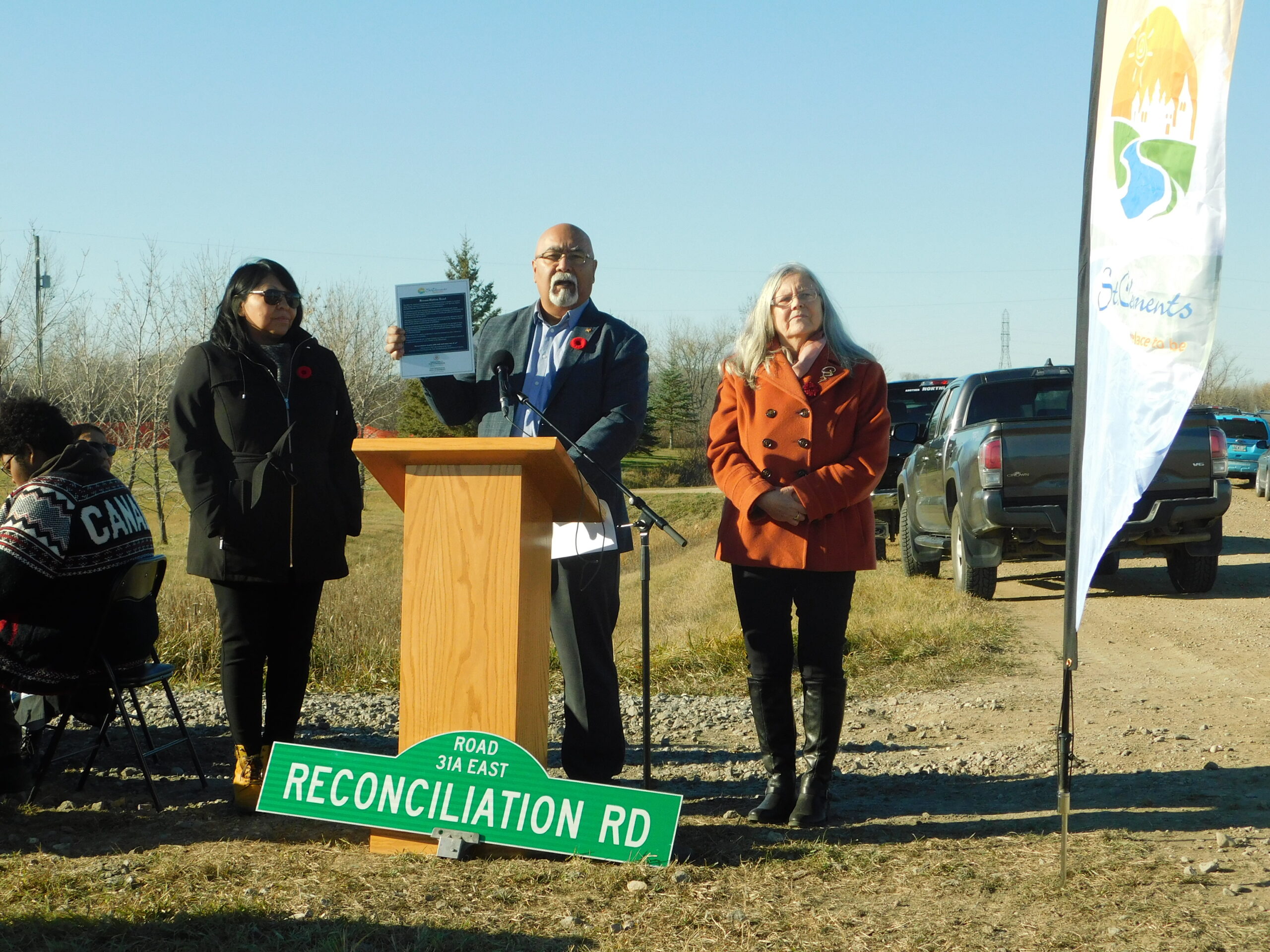
After the plaque was read, the old Colonization Road sign was taken down and the new Reconciliation Road sign was erected. In the background the Little Buffalo Singers and Drummers were playing and cheering was heard as this long awaited change was made.

